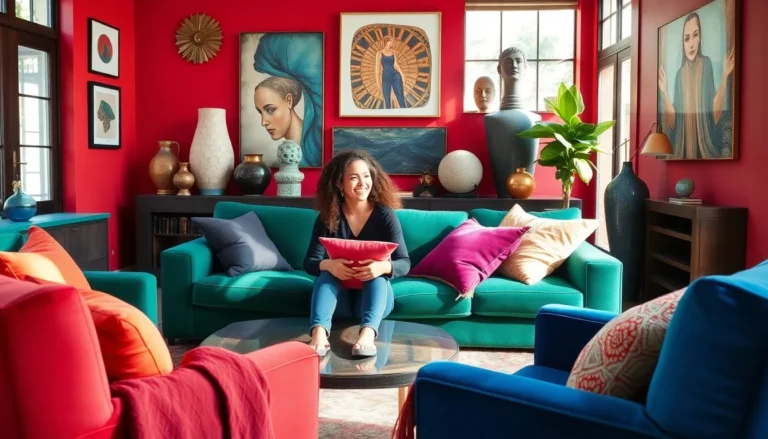Table of Contents
ToggleIn the great debate of renting versus buying, one might wonder if they should commit to a mortgage or embrace the freedom of a rental agreement. It’s like choosing between a cozy puppy and a demanding toddler—both have their perks, but one is definitely less messy. Renting offers flexibility, making it easier to relocate without the headache of selling a home. Plus, who wouldn’t want to avoid the joys of plumbing repairs and surprise roof leaks?
On the flip side, buying a home can feel like planting your flag on the moon. It’s a long-term investment that can build equity and provide stability. But let’s be real, the thought of mowing the lawn every Saturday can be a bit daunting. So whether one prefers the carefree lifestyle of renting or the stability of homeownership, understanding the benefits of each can help make the right choice.
Benefits of Renting Vs Buying
Renting offers flexibility that homeownership often lacks. Individuals can easily move for job opportunities or personal reasons without the burden of selling a property. Monthly rental payments also provide predictability, as they typically include maintenance and repair responsibilities.
A short-term commitment is another advantage of renting. Renters escape the long-term financial obligations associated with mortgages. They benefit from not worrying about property depreciation or market fluctuations.
Buying a home presents unique financial advantages. Homeownership builds equity over time, acting as a long-term investment. Homeowners can also take advantage of tax deductions, providing potential savings on mortgage interest and property taxes.
Stable housing costs can occur with fixed-rate mortgages. Homeowners not only build equity but also enjoy the potential for appreciation in property value. They can customize their homes without landlord restrictions, allowing for personal expression and improvements.
Renting typically requires less upfront capital. Security deposits are usually lower than down payments. Renting avoids the cost of closing fees and inspections, which can add thousands.
For renters, access to amenities is common. Many rental properties include pools, gyms, and other facilities that would be costly for homeowners to maintain. This aspect often enhances lifestyle enjoyment without additional responsibilities.
Each option suits different financial situations and personal goals. Understanding these benefits helps individuals make informed decisions tailored to their circumstances.
Financial Considerations

Financial aspects play a crucial role in deciding whether to rent or buy a home. Evaluating initial costs and long-term expenses reveals insights into each option.
Initial Costs
Renters face lower initial expenses. Typically, moving into a rental requires only a security deposit and the first month’s rent. Landlords often cover maintenance, which eliminates upfront expenditures associated with repairs. In contrast, buying a home necessitates a significant down payment, usually ranging from 3% to 20% of the property’s purchase price. Additional costs like closing fees, inspection fees, and property taxes add to the financial burden of purchasing. These initial figures shape financial readiness and can sway decisions.
Long-Term Expenses
Long-term expenses vary considerably between renting and buying. Renters endure predictable monthly payments which often include utility costs. This predictability aids budget planning, making it easier for renters to allocate funds for other needs. Homeownership entails various long-term expenses such as mortgage payments, property taxes, insurance, and maintenance costs. Monthly mortgages can be higher than rent. Over time, rising maintenance demands require owners to invest in repairs and renovations. These financial responsibilities significantly influence ongoing cash flow and lifestyle choices.
Flexibility and Stability
Renting and buying a home provide distinct advantages in terms of flexibility and stability. Each option offers a unique approach to housing needs.
Mobility Benefits of Renting
Renting allows for greater mobility. Individuals can relocate easily due to job changes or personal preferences. Short-term leases often cater to those who value flexibility, making it simpler to explore various neighborhoods or cities. Renters tend to require minimal commitment, serving as an advantage for those uncertain about their long-term plans. Additionally, landlords handle maintenance responsibilities, allowing tenants to focus on their relocation without worrying about property upkeep. This freedom can enhance personal and professional growth by enabling quick changes in living situations.
Stability of Homeownership
Homeownership provides long-term stability, creating a sense of permanence. Equity builds over time, making it a valuable financial investment. Owners can customize their homes according to personal tastes and preferences. Tax deductions also offer financial relief, contributing further to stability. Moreover, homes generally appreciate in value, increasing the return on investment. Homeowners enjoy the consistency of fixed mortgage payments, which contrasts with potential rent increases. This stability fosters community ties and a stronger connection to the neighborhood, enhancing overall well-being.
Lifestyle Choices
Lifestyle choices significantly influence the decision between renting and buying a home. Personal circumstances and future plans dictate whether flexibility or stability plays a more considerable role in an individual’s living situation.
Maintenance Responsibilities
Maintenance responsibilities differ greatly between renting and owning. Renters typically enjoy a hassle-free living experience since landlords manage repairs and upkeep. Routine maintenance needs, such as plumbing issues or appliance malfunctions, fall on the landlord’s shoulders. Consequently, renters can focus on their daily lives without wrestling with unexpected repair costs. Homeowners, however, shoulder these responsibilities entirely. They must address maintenance tasks promptly, from landscaping to roof repairs. This added burden can impact time and budget, influencing lifestyle satisfaction.
Personalization and Customization
Personalization and customization define the experience of homeownership vs. renting. Renters face limitations in altering their living spaces, often needing permission for even minor changes. They may struggle with a lack of personalization, as lease agreements restrict renovations or decor alterations. Homeownership, on the other hand, allows individuals to create their dream environments. Owners can paint walls, remodel kitchens, and landscape yards according to their preferences without restrictions. Such freedom fosters a sense of belonging and enhances satisfaction in their living space. Each choice reflects varied lifestyles and personal values that individuals prioritize in their living situations.
Market Trends
Current market trends highlight significant shifts in the real estate landscape. Understanding these trends aids in choosing between renting and buying.
Real Estate Market Overview
The real estate market has shown fluctuations over recent years. Prices for homes increased by approximately 10% annually in several regions. Interest rates also impact home affordability. Higher rates discourage some buyers, leading to reduced demand and possibly lower prices. Analyzing local markets reveals unique patterns. Areas with job growth often experience stable home values, while regions with declining populations may see decreases in property values. Buyers should consider these dynamics when deciding to purchase.
Rental Market Insights
Rental markets remain strong amid rising home prices. Average rents have surged by 5% in major cities, reflecting high demand. Many individuals prefer renting due to financial flexibility and fewer responsibilities. Renters can access desirable locations without committing to a home purchase. Competition for rental properties can create quick turnover, pushing rental prices further up. Understanding local trends helps renters negotiate leases. Some markets even favor renters with incentives, such as no-fee listings or promotional discounts. Tracking these insights ensures renters make informed decisions amid ever-evolving conditions.
Deciding between renting and buying a home ultimately hinges on individual priorities and circumstances. For those who value flexibility and lower upfront costs renting offers an appealing option. It allows for mobility without the weight of maintenance responsibilities.
On the other hand homeownership presents a pathway to stability and long-term investment. Homeowners can build equity and customize their spaces while enjoying tax benefits.
Understanding personal goals and financial situations is crucial in making the right choice. Whether one opts for the freedom of renting or the permanence of buying being informed about the current market trends can significantly influence the decision.







